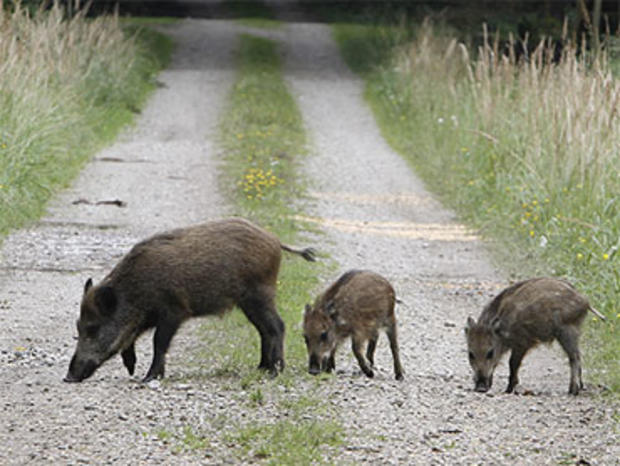Radioactive Boars Part of Chernobyl's Legacy
Well, if wild boars don't already haunt your nightmares, try radioactive boars.
Almost 25 years after the Chernobyl meltdown in Ukraine, the German government is making big payments to hunters to compensate them for radioactive meat that is considered too dangerous for human consumption.
According to the Environment Ministry in Berlin, almost euro425,000 ($555,000) was paid to compensate hunters for contaminated wild boar meat - four times higher than payments made in 2007.
But Der Spiegel reports that the higher payments have more to do with the exploding boar population, caused by climate change. As Central Europe warms up, beech and oak trees overproduce seeds and farmers are growing more crops that the wild pigs eat, Torsten Reinwald, of the German Hunting Federation, told the Associated Press.
"The number of boars in Germany has quadrupled or quintupled over the last years, as has the number of boars shot," Reinwald said.
According to the German Hunting Federation, 650,000 boars were shot during the 2008-2009 hunting season, compared with 287,000 the year before.
Wild boars are susceptible to higher levels of radiation than other animals because their diet includes lots of mushrooms and truffles, which tend to absorb the radiation.
The impact of Chernobyl has generally decreased in Germany and is less of a problem on fields that are used for commercial crops, Florian Emrich, spokesman of the Federal Office for Radiation Protection told the Associated Press. But forest soil in some regions, such as Bavaria and Baden-Wuerttemberg still have high levels of Cesium-137 which has a half life of roughly 30 years, Emrich said. And some hunting experts say the isotope is just now hitting the soil layer that boars are routing around in for food.
Authorities require that wild boar meat be tested for safety, and hunters comply since the government compensation can sometimes be higher than market rates.
The good news: a harsh winter may mean that boar populations will stabilize. But in the meantime, those swine aren't staying put on the countryside. This summer alone, Spiegel reported that a wild pig attacked a man in a wheelchair in a Berlin park, two dozen boars marched into the Eastern German town of Eisenach, and in another incident, the animals closed down a German highway for hours.
Wild boars slowing down traffic on an autobahn? Now, that's a nightmare.
